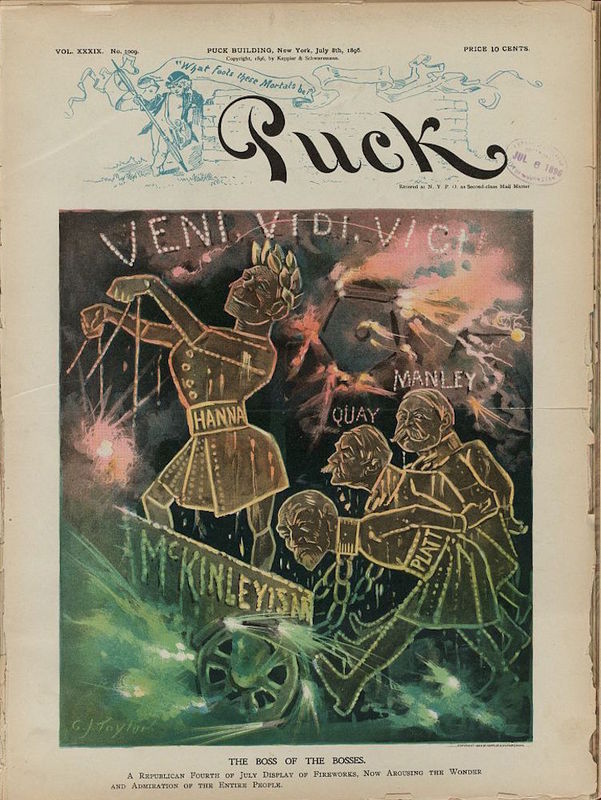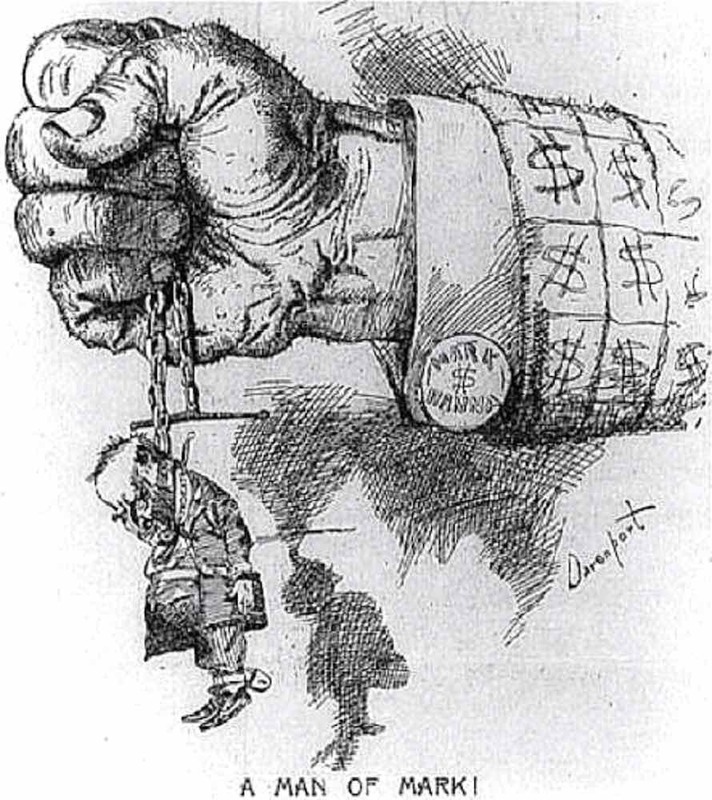
The plaque placed on the Marcus Hanna Monument in University Circle brings to mind a letter by Marcus Hanna's brother, H. M. Hanna. In the letter, he details the discussion about what should be inscribed on it. H. M. Hanna and Samuel Mather, an iron ore-shipping tycoon, desired to have the inscription say something about Marcus Hanna's work with the community. Lawyer and Cuyahoga County Judge William B. Sanders and railway baron and senator James H. Hoyt wanted the plaque to contain something about his civic work in the government. However, Hanna's crowning political achievement - getting William McKinley elected as President and how Hanna's tactics during that campaign alter how Presidents are elected in the United States - is sadly absent from the monument's inscription.
Marcus Hanna's early political activities had a lasting effect on his life. He was known to be very active in elections in Cleveland's Ninth Ward and fought to keep party bosses in check. This was because he thought that businessmen like him should be the authority in politics and not the party bosses. His appeal to Cleveland capitalists would eventually gain him allies in the major industrial elites of the city. Nevertheless, Marcus Hanna would eventually work within the system of the party bosses and gain political power through that system. It was not long until the same important professional politicians who despised him were coming for his aid. Hanna began by fighting the established local political mechanism but later in his career used it to his advantage.
The next stage of his career came with his friendship with William McKinley. The two men met at the 1884 Republican convention when they supported rival candidates. However, it was during the 1888 convention that Hanna saw McKinley's political potential after he heard several of his speeches during the convention and saw how he carried himself. After the convention Hanna became involved in McKinley's struggles to be House Speaker and Governor of Ohio. Hanna even went to St. Louis for the 1896 convention to make sure McKinley was nominated. His hard work resulted in McKinley's being a first ballot nomination. Marcus Hanna was now ready for the biggest political fight of his life.
William McKinley could not travel across the country to give speeches due to the ill health of Mrs. McKinley. So, Marcus Hanna had to rely on flyers, posters, and other such written ads to promote McKinley. Hanna was able to portray the Democrats as out of touch with the common man with his "full dinner pail" campaign. He was even able to garner support from the African American community with the help of allies like John Patterson Green. Yet there were many including McKinley who wondered about the methods that Hanna used and if they would pay off. On the night of the election all Marcus Hanna could do was wait and see if his work would be rewarded. On that night Marcus Hanna would see his labors bear fruit. When the votes began to be tallied McKinley was viewed to win with at least 264 electoral votes. The next day Marcus Hanna announced the outcome of the election in Cleveland's public square where he was greeted with the chant of "Hanna, Hanna."
After the election many people including McKinley himself wrote letters congratulating Hanna for his work on the campaign. Hanna had finally seen the rewards of the political struggles realized. His importance to our election process cannot be overemphasized. His ability of, to quote the historian Francis Russell, "selling McKinley to the public like soap or Tobacco" led the way to the method of campaigning that is used today. Historian William Poundstone even called Hanna "an early example of a political consultant." The Hanna Monument sits in University Circle overlooked by many people who pass by in their cars. This monument to Marcus Hanna's determination that not only got William McKinley elected but transformed the manner of political campaigning sits alone and forgotten amidst busy University Circle.
Images






